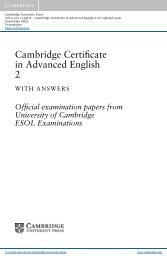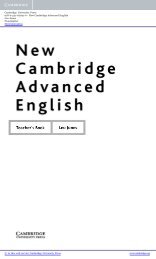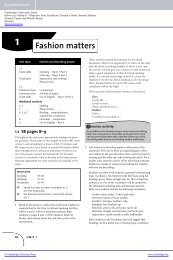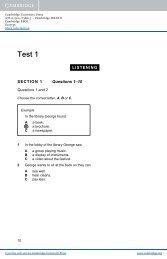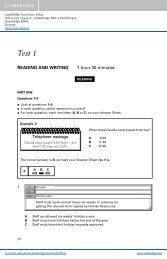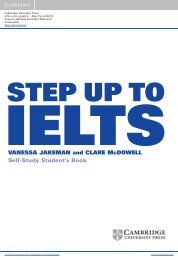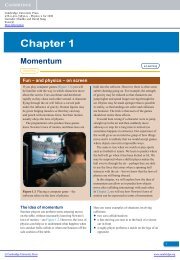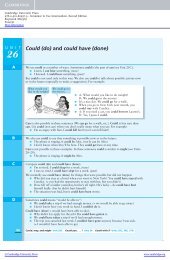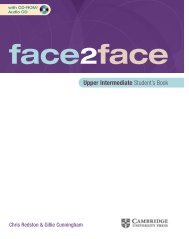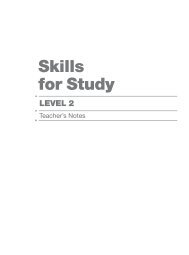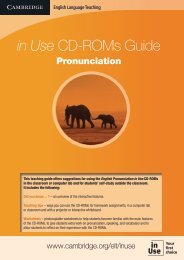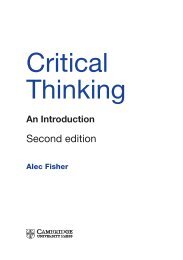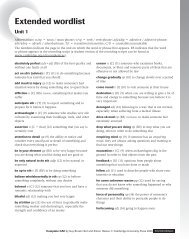FCE SB PRELIMS WITH ANSWERS.indd - Cambridge University ...
FCE SB PRELIMS WITH ANSWERS.indd - Cambridge University ...
FCE SB PRELIMS WITH ANSWERS.indd - Cambridge University ...
Create successful ePaper yourself
Turn your PDF publications into a flip-book with our unique Google optimized e-Paper software.
<strong>Cambridge</strong> <strong>University</strong> Press978-0-521-69826-9 - Complete First Certificate Student’s Book with answersGuy Brook-HartFrontmatterMore informationListening Speaking Vocabulary Grammar• Listening Part 1: Young people talkingabout their family lives• Two candidates doing Speaking Part 1• A young woman talking about an amazingexperience• Listening Part 2: Video and computer games• Talking about one’s family• Speaking Part 1: Giving personalinformation• Comparing free-time activities• Speaking Part 2: Talking about free timeand hobbies• Adjectives describing character• Housework collocations• Collocations with make and doPhrasal verbs• Present simple and continuous• Present perfect simple andcontinuous• Asking questions• Adjectives with -ed and -ing• Comparison of adjectives andadverbs• Listening Part 3: Five young people talkabout last year’s holiday• Two candidates doing Speaking Part 3• Five people talking about unforgettablejourneys• Listening Part 4: The Slow Food Movement• Two candidates doing Speaking Part 4• Talking about one’s favourite type ofholiday• Speaking Part 3: Deciding on an end-ofyeartrip• Turn-taking• Talking about favourite dishes and healthyeating• Speaking Part 4: Supporting your opinions• Types of holiday, holiday locations andactivities• Journey, trip, travel, wayFood, dish, meal• Past simple, past continuousand used to• Past perfect simple andcontinuous• So and such• Too and enough• Listening Part 1: Young people talkingabout studying abroad• Two candidates doing Speaking Part 1• Listening Part 2: Rainforest project, CostaRica• Two candidates doing Speaking Part 2• Talking about reasons for studying abroad• Speaking Part 1: Talking about studying• Talking about environmental threats• Talking about your area in 20 years’ time• Speaking Part 2: Useful phrases andvocabulary• Words connected with studying• Find out, get to know, know, learn, teach,study; attend, join, take part in, assist• Words connected with the environment• Look, see, watch, listen, hear• Prevent, avoid, protect; reach, arrive, get (to)• Zero, fi rst and secondconditionals• Indirect questionsWays of expressing the future• Listening Part 3: Five people talking aboutfi rst job• Two candidates doing Speaking Part 3• Adventure racing• Listening Part 4: Learning to paraglide• Two candidates doing Speaking Part 4• Talking about suitable jobs for students• Speaking Part 3: Suggesting, agreeing anddisagreeing, asking opinions• Working together as volunteers• Talking about adventure sports• Talking about danger in sport• Speaking Part 4: Introducing an opinion,explanation, or exampleWork or job; possibility, occasion,opportunity; fun or funnyTypes of adventure sport• Countable and uncountablenouns• ArticlesInfi nitive and verb + -ing• Listening Part 2: Participating in a quizshow• Two candidates doing Speaking Part 1• Listening Part 1: Eight extracts on differentsubjects• Two candidates doing Speaking Part 3• Talking about TV tastes• Speaking Part 1: Talking about likes anddislikes• Talking about things which make you happy• Speaking Part 3: Speculating, usingvocabulary• Types of TV programme• Play, performance, acting; audience,public, spectators; scene, stageMake, cause, have; stay, spend, pass• Reported speech 1• Linking words for contrastModal verbs to express certaintyand possibility• Listening Part 4: Redsands Park• Two candidates doing Speaking Part 2• Six people talk about being healthy• Listening Part 3: Five people talk about theirvisits to the doctor• Four candidates doing Speaking Part 4• Young people talking about attitudes to health.• Listening Part 1: Eight extracts on differentsubjects connected with animals• Two candidates doing Speaking Part 1• Talking with foreign visitors about shopping• Talking about teenage spending andpocket money• Who does the shopping?• Speaking Part 2 : Speculating• Talking about what it means to be healthy• Speaking Part 4: Discussing health issues• Talking about the roles of animals in our lives• Talking about dangerous animals• Speaking Part 1: Talking about animals• Types of shop• Phrasal verbs• Words connected with money• Words connected with health• Parts of the body• Medical vocabularyNamed, called• Modals expressing ability• As and like• Look, seem, appearRelative pronouns and relativeclauses• Third conditional• Wish, if only, hope• Listening Part 2: A haunted house• Five young people talking about stayingwith host families• Talking about choosing where to live• Describing somewhere you have lived• Renovating a holiday home• Speaking Part 2: Different places to live• Types of housing• Space, place, room, area, location, square• Causative have• Expressing obligation andpermission• Listening Part 4: The Hat Fair• Two candidates doing Speaking Part 3• Talking about festivals• Speaking Part 3: Turn-takingActivities during festivals• The passive• The passive with reporting verbs• Listening Part 3: Five young people talkabout their parents and computers• Two candidates doing Speaking Part 4• Discussing uses of different devices• Speaking Part 4: Discussing newtechnology• Types of machine or gadget• Check, supervise, control• Linking words: when, if, in case,even if, even though, whether• Reported speech 2: reporting verbsMap of the units5© <strong>Cambridge</strong> <strong>University</strong> Press www.cambridge.org
<strong>Cambridge</strong> <strong>University</strong> Press978-0-521-69826-9 - Complete First Certificate Student’s Book with answersGuy Brook-HartFrontmatterMore informationIntroductionWho this book is forComplete First Certificate is a stimulating and thoroughpreparation course for students who wish to take theFirst Certificate exam from <strong>Cambridge</strong> ESOL. It teachesyou the reading, writing, listening and speaking skillswhich are necessary for the exam as well as essentialgrammar and vocabulary. If you do not want to do theexam, the book teaches you skills and language at anupper-intermediate level (Common European Frameworklevel B2).What the book containsIn the Student’s Book there are:• 16 units for classroom study. Each unit contains:• one part of each of the five papers in the FirstCertificate exam. The units provide language inputand skills practice to help you to deal successfullywith the tasks in each part.• essential information on what each part of the examinvolves and the best way to approach each task.• a wide range of enjoyable and stimulating speakingactivities designed to increase your fluency andyour ability to express yourself.• a step-by-step approach to doing First CertificateWriting tasks.• grammar activities and exercises with the grammaryou need to know for the exam. When you aredoing grammar exercises you will sometimes seethis symbol: . These are exercises which arebased on research from the <strong>Cambridge</strong> LearnerCorpus and they deal with areas which causeproblems for many students when they do theexam.• vocabulary necessary for First Certificate. Whenyou see this symbol by a vocabulary exercise,the exercise focuses on words which FirstCertificate candidates often confuse or use wronglyin the exam.• Eight unit reviews. These contain exercises whichrevise the grammar and vocabulary that you havestudied during the previous two units.• Speaking and Writing reference sections. Theseexplain the possible tasks you may have to do inthe Speaking and Writing papers, and they give youexamples and advice on how best to approach them.• A Grammar reference section which clearly explainsall the main areas of grammar which you need toknow for the First Certificate exam.• A complete First Certificate exam supplied by<strong>Cambridge</strong> ESOL for you to practise with.• A CD-ROM provides extra practice, with all extraexercises linked to the topics in the Student’s Book.Also available are:• Three audio CDs containing listening material for the16 units plus the recorded Listening Test supplied by<strong>Cambridge</strong> ESOL. The listening material is indicatedby different coloured icons in the Student’s Book asfollows: CD1, CD2, CD3.• A Teacher’s Book containing:• Step-by-step guidance for handling all theactivities in the Student’s Book.• A large number of suggestions for alternativetreatments of activities in the Student’s Bookand a large number of suggestions for extendingactivities beyond what is contained in theStudent’s Book.• Extra photocopiable materials for each unit of theStudent’s Book to practise and extend languageabilities beyond the requirements of the FirstCertificate exam.• Complete answer keys including sample answersto Writing tasks.• Complete recording scripts for all the recordedmaterial.• Four photocopiable progress tests, one for everyfour units of the book.• 16 photocopiable word lists (one for each unit)containing vocabulary found in the units. Eachvocabulary item in the word list is accompaniedby a definition from the <strong>Cambridge</strong> AdvancedLearner’s Dictionary.• A Student’s Workbook to accompany the Student’sBook, with four pages of exercises for each unit.These exercises practise the reading, writing andlistening skills needed for the First Certificateexam. They also give further practice in grammarand vocabulary. The Student’s Workbook is alsoaccompanied by an audio CD containing listeningmaterial.6Introduction© <strong>Cambridge</strong> <strong>University</strong> Press www.cambridge.org
<strong>Cambridge</strong> <strong>University</strong> Press978-0-521-69826-9 - Complete First Certificate Student’s Book with answersGuy Brook-HartFrontmatterMore informationFirst Certificate content and overviewPart/timing Content Test focus1READING1 hourPart 1 A text followed by eight multiple-choice questions.Part 2 A text from which seven sentences have been removed andplaced in a jumbled order, together with an additional sentence, afterthe text.Part 3 A text or several short texts preceded by 15 multiple-matchingquestions.Candidates are expected toshow understanding of specificinformation, text organisationfeatures, tone, text structure.2WRITING1 hour 20minutes3USE OFENGLISH45 minutes4LISTENINGApproximately40 minutes5SPEAKING14 minutesPart 1 One compulsory question.Part 2 Candidates choose one task from a choice of five questions(including the set text options).Part 1 A modified cloze test containing 12 gaps and followed by 12multiple-choice items.Part 2 A modified open cloze test containing 12 gaps.Part 3 A text containing 10 gaps. Each gap corresponds to a word.The stems of the missing words are given beside the text and mustbe changed to form the missing word.Part 4 Eight separate questions, each with a lead-in sentence and agapped second sentence to be completed in two to five words, one ofwhich is given a ‘key word’.Part 1 A series of eight short unrelated extracts from monologuesor exchanges between interacting speakers. There is one multiplechoicequestion per extract.Part 2 A monologue or text involving interacting speakers, with asentence completion task which has 10 questions.Part 3 Five short related monologues, with five multiple-matchingquestions.Part 4 A monologue or text involving interacting speakers, withseven multiple-choice questions.Part 1 A conversation between the interlocutor and each candidate(spoken questions).Part 2 An individual ‘long turn’ for each candidate, with a briefresponse from the second candidate (visual and written stimuli,with spoken instructions).Part 3 A two-way conversation between candidates (visual andwritten stimuli, with spoken instructions).Part 4 A discussion on topics related to Part 3 (spoken questions).Candidates are expected to beable to write non-specialisedtext types such as an article,an essay, a letter, an email,a report, a review or a shortstory, with a focus on advising,apologising, comparing,describing, explaining,expressing opinions, justifying,persuading, recommending,suggesting.Candidates are expected todemonstrate the ability to applytheir knowledge of the languagesystem by completing a numberof tasks.Candidates are expected to beable to show understanding ofattitude, detail, function, genre,gist, main idea, opinion, place,purpose, situation, specificinformation, relationship, topic,agreement, etc.Candidates are expected to beable to respond to questionsand to interact in conversationalEnglish.First Certificate content and overview7© <strong>Cambridge</strong> <strong>University</strong> Press www.cambridge.org



